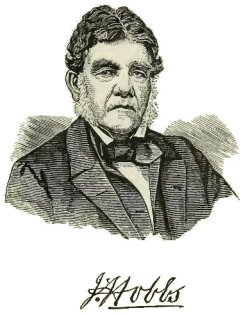

 James Hobbs's mother Jane was born in New York. An American loyalist, she married about 1780 Lieut
William Hobbs of the Royal Navy a Cornishman serving on the American station.
James Hobbs's mother Jane was born in New York. An American loyalist, she married about 1780 Lieut
William Hobbs of the Royal Navy a Cornishman serving on the American station.
They produced four daughters Judith, Rebecca, Ann Jane and Charity and two sons William and James.
Lieut Hobbs died at Portsmouth of severe internal injuries after a fall while in command of HM Brig Bounder in the Jersey Roads in 1799. He had served in 21 confrontations with the enemy. Soon afterward their sons William (already a Lieut) and the boy James (9 years old) saw service in Egypt where William was killed.
The eldest daughter Judith married a naval surgeon. William Hopley who had an excellent naval record. Ill health had caused him to apply for his discharge with the request that he should be considered for appointment to NSW, also that the whole family should accompany him as settlers.
The matriarch of the family, his mother-in-law Jane was a forty-two years old widow, must have been a strong character to have sailed in the Ocean , a whaler, to make a new life with her remaining son James, still only ll years old, her four daughters, son-in-law and granddaughter Julia.
During the voyage both Judith and 16 years old Rebecca became pregnant. Rebecca's baby was born during their stay at Port Phillip and the Rev. Knopwood married her to the child's father, the settler John Ingle, shortly after their arrival in Hobart Town.
John Ingle became a successful merchant and built his home, a cottage on land where Richard Lord later built Ingle Hall on the corner of Argyle and Macquarie Sts. Where it still stands (next to "Mercury" building). Judith's son Richard Hopley was the first born European in Hobart Town.
Ann Jane married George Prideaux Harris and Charity married William Collins who established the first whaling station on the Derwent River at Droughty Point.
All of Jane's daughters had successful marriages. John Pascoe Fawkner wrote of them with great admiration, their conduct was exemplary and carried great weight in counteracting the gross immorality existing in high places. Jane died in Hobart in 1813.
Young James Hobbs and another boy, George Collins, the son of Lieut Gov Collins, were aboard the Porpoise with Captain Bligh in 1809 when he called into the Derwent after setting sail for England from Sydney. Trouble had been brewing aboard even prior to their arrival in the Derwent. James Hobbs, when an old man recalled that a young midshipman who had received twenty-four lashes for neglect of duty and drunkenness aboard Porpoise was actually the son of the Lieut Governor.
(from:Convicts Unbound by Marjorie Tipping)
On aboriginals: James Hobbs stated in later years that sealers stole aboriginal women, though sometimes that was not necessary because at one time aboriginal men would sell a woman for four or five seal carcasses. Hobbs said about 1815 he saw 300 sheep killed by aboriginals at Oyster Bay as a result of which 22 aboriginals were murdered the next day by a party of the 48 th Regiment.
About 1820 James Hobbs was appointed as Wharfinger in Hobart Town.
(Reference: A History of Tasmania by Lloyd Robson.)
Mr James Hobbs (1792-1880), explorer, was born on 8 April 1792 at Saltash, near Plymouth, Devon, England.
Hobbs arrived in Van Diemen's Land aboard the Ocean as a boy aged eleven with his widowed mother Jane, his four sisters Judith, Rebecca, Anne Jane and Charity.
In 1824 Hobbs was asked by Lieutenant-Governor Sorell to closely explore the colony's coastline to locate ports, rivers, and land suitable for settlement.
Hobbs left Hobart Town on 5 February 1824 with two well equipped open boats manned by twelve carefully chosen convicts. They met exceptionally bad weather, suffered serious food shortages and both boats were severely damaged. The larger one was replaced by the commandant at Macquarie Harbour, the other was repaired, and Hobbs completed the circumnavigation on 10 July. This was undoubtedly the most noteworthy event of his career.
(Reference: Australian Dictionary of Biography)